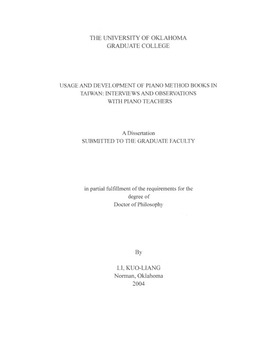| dc.contributor.advisor | Magrath, Jane, | en_US |
| dc.contributor.advisor | Barry, Nancy, | en_US |
| dc.contributor.author | Li, Kuo-liang. | en_US |
| dc.date.accessioned | 2013-08-16T12:19:19Z | |
| dc.date.available | 2013-08-16T12:19:19Z | |
| dc.date.issued | 2004 | en_US |
| dc.identifier.uri | https://hdl.handle.net/11244/696 | |
| dc.description.abstract | Several results imply that Taiwan's piano education circle has gradually changed from pianistic technique-based lessons to emphasizing the integrity of music learning. Teachers' strong tendency of combining different methods and materials implies that Taiwanese piano teachers feel hesitant and insecure to use either American methods or European methods exclusively. Also, Taiwanese piano teachers are not enthusiastic about developing methods because of the existing abundant materials in Taiwan's small market. This result may imply that expert teachers are more independent regarding the use and selection of methods. It may also imply the common attitude of Taiwan's ignorance of innovation. For future development of methods, Taiwan may need to expand its market to other Chinese speaking countries in order to make the development of those methods more price-worthy. | en_US |
| dc.description.abstract | The purposes of this research are: (a) to evaluate the use of elementary-age piano methods in Taiwan and discuss the advantages and disadvantages of different methods from an experienced Taiwanese piano teacher's point of view, especially relating to Taiwan's cultural background and structure of society, and (b) to provide a basis for developing future methods suitable for Taiwanese culture. Four categories of research questions were addressed. (1) What do experienced Taiwanese piano teachers think of the methods from different countries? (2) How do they use these methods? (3) Are there any problems for Taiwanese piano teachers in using the foreign methods? and (4) Is it important to develop Taiwanese methods? | en_US |
| dc.description.abstract | The findings indicate that Taiwanese teachers believe that European methods are technique-oriented and efficient while American methods, in contrast, are more motivational, interesting, and are thoroughly concerned with the development of musical concepts. Therefore, Taiwanese teachers have a strong tendency towards combining the European method Beyer with American methods, along with Japanese anthologies. However, teachers indicate several problems with using foreign methods, including the English alphabet problem, language translation problems, physical problems, and repertoire selection problems. Teachers in this study had a strong tendency towards thinking that the development of Taiwanese methods is not necessary. However, they offered several suggestions for developing future Taiwanese methods, including adding music appreciation materials, Chinese literature and Chinese musical concepts within the mainstream, and western-based classical music content. | en_US |
| dc.description.abstract | This study employed a qualitative methodological approach. Individual, in-depth interviews with ten expert Taiwanese piano teachers and observations of each expert's teaching of two elementary-age students were conducted to collect data. The non-probability, snowball sampling technique was used to select ten participants. After the interviews were transcribed, copies of the transcripts were sent to the participants to assure them of the study's trustworthiness. Afterwards, the researcher searched for patterns and common themes among participant's responses. After coding the data, the researcher discussed and resolved disagreements with the independent reviewer before addressing the findings. | en_US |
| dc.format.extent | ix, 224 leaves ; | en_US |
| dc.subject | Education, Music. | en_US |
| dc.subject | Music. | en_US |
| dc.subject | Piano Methods. | en_US |
| dc.subject | Piano Instruction and study. | en_US |
| dc.title | Usage and development of piano method books in Taiwan: Interviews and observations with piano teachers. | en_US |
| dc.type | Thesis | en_US |
| dc.thesis.degree | Ph.D. | en_US |
| dc.thesis.degreeDiscipline | School of Music | en_US |
| dc.note | Co-Chairs: Jane Magrath; Nancy Barry. | en_US |
| dc.note | Source: Dissertation Abstracts International, Volume: 65-01, Section: A, page: 0101. | en_US |
| ou.identifier | (UMI)AAI3120035 | en_US |
| ou.group | Weitzenhoffer Family College of Fine Arts::School of Music | |
